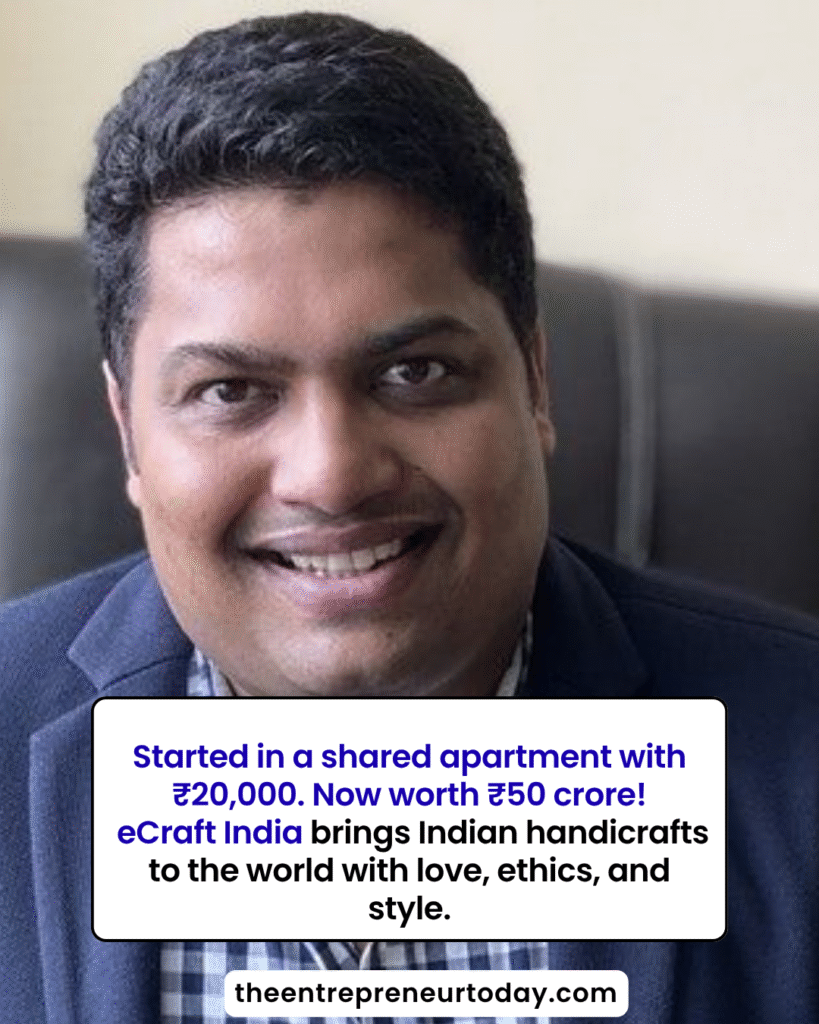What started as a small online experiment by two brothers and a friend from Delhi has evolved into one of India’s most inspiring e-commerce success stories. eCraft India, founded in 2014 by Rahul Agarwal, Ankit Agarwal, and Pawan Goyal, began with a modest investment of ₹20,000 — and a mission to bridge India’s traditional artisans with modern online buyers.
Today, with a turnover exceeding ₹50 crore, a catalog of over 10,000 handcrafted products, and partnerships with more than 5,000 artisans nationwide, eCraft India stands as a symbol of how technology and tradition can together create sustainable business growth.
Inspiration from India’s Heartland
The idea for eCraft India was born during a trip to Rajasthan. The three founders, all in their mid-20s, were moved by the plight of local artisans — skilled craftsmen who struggled to make ends meet while middlemen took a large share of their earnings.
Determined to find a solution, they envisioned a digital platform that would allow artisans to showcase and sell their work directly to customers, without exploitation or heavy commissions. With little capital but immense passion, the trio began their journey from a small rented apartment in Delhi.
Bootstrapping from a Shared Apartment
Their first “warehouse” was a shared bedroom stacked with handmade items — wooden carvings, brass showpieces, and textile décor sourced from Jaipur and Jodhpur. With only ₹20,000 pooled from part-time jobs and family help, they started eCraftIndia.com and listed their first product — a ₹250 wooden elephant showpiece — on social media and online marketplaces.
They managed every task themselves — sourcing, photography, packaging, shipping, and customer service. Early sales were sporadic but promising. As they refined their SEO, used Facebook promotions, and focused on product storytelling, orders began to grow steadily.
By 2016, monthly revenues had crossed ₹10 lakh, driven by urban customers seeking authentic yet affordable home décor.
Digital Innovation Meets Traditional Craft
Unlike many e-commerce players chasing volume, eCraft India focused on curation and authenticity. Each product was sourced directly from artisans, ensuring fair trade practices and preserving local craftsmanship.
The brand emphasized storytelling — highlighting the origin and artistry behind each product. This approach resonated strongly with millennial buyers who wanted more than just décor; they wanted cultural connection and ethical value.
To streamline operations, the team invested in an in-house logistics system and automation tools to manage inventory, orders, and vendor payments efficiently.
Scaling Ethically and Sustainably
As the company grew, eCraft India expanded its partnerships to include artisan communities across Rajasthan, Gujarat, Uttar Pradesh, and West Bengal. Training programs were introduced to help craftsmen improve product quality, packaging, and digital literacy.
Over time, the platform evolved from a small website into a major e-commerce hub featuring categories like wall décor, lamps, idols, and festival gifts. The company also began exporting to the US, UK, and Middle East, bringing Indian handicrafts to global audiences.
Today, eCraft India sells through both its own website and major online marketplaces, serving millions of customers while retaining its ethical roots.
Empowering Artisans Through Technology
Co-founder Rahul Agarwal says their mission goes beyond profit: “We wanted to create a system where artisans earn what they deserve. Every sale supports a family and keeps India’s heritage alive.”
Ankit adds, “The success of eCraft India proves that traditional crafts can thrive in the digital age if given the right platform and respect.”
From a single ₹250 sale to a ₹50-crore global enterprise, eCraft India’s journey underscores how technology, empathy, and entrepreneurship can together revive an age-old art form — and turn it into a sustainable business model for the future.
Last Updated on Wednesday, October 15, 2025 2:02 pm by The Entrepreneur Today Desk
